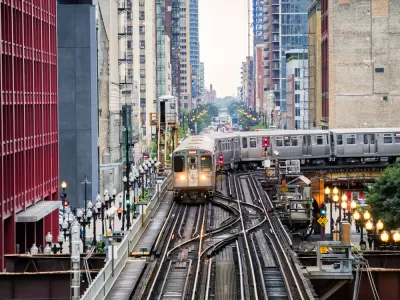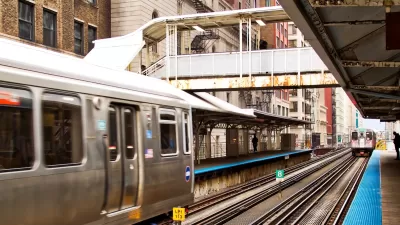Ahead of a multi-million dollar fiscal cliff in 2026, CTA, Metra, and Pace pushed back on a potential merger at the first of several hearings to determine their futures in the wake of decreased ridership.

At a recent hearing addressing dwindling funding and the looming end of COVID-19 pandemic relief funds, Nick Blumberg reported for WTTW News on what CTA, Metra, and Pace leaders said their approach would be to fight the $730 million fiscal cliff in their path. They pushed back on a $1.5 billion proposal from lawmakers to merge the three agencies, reasoning that more individual funding and reforms would have a greater positive impact.
All three heads of agencies–Melinda Metzger of Pace, Dorval Carter of CTA, and Jim Derwinski of Metra–acknowledged the cash deficit and proposed more individually directed funding and reforms in lieu of a merger. Blumberg reports that transit leaders said the merger “wouldn’t create the cost savings advocates hope for, would reduce the impact of local input and expertise, and wouldn’t do much to increase service levels.”
Adding to this sentiment, RTA board chair Kirk Dillard told lawmakers that, having been a part of similar debates in recent years, the kinds of reforms that transit agency leaders are proposing have created “one of the nation’s best transit systems.” In support of increased funding for all three agencies, he added that “funding cures most ills.”
In return, government leaders made it clear that there is little room for additional funding without significant changes to make the transit system not only reliable, but “accountable and transparent,” State Sen. and chair of the Senate Transportation Committee Ram Villivalam said in the hearing.
Reforms mentioned by Metzger, Carter, Derwinski, and Dillard that would garner that additional funding include shifting Metra schedules from a commuter rail model to a regional rail model, addressing repair backlogs to keep trains moving safely and smoothly, and a new daily pass that would allow riders to access CTA, Metra, and Pace.
Sen. Villivalum ended the hearing with the conclusion that the merger may move forward or lawmakers may explore other avenues of improving the Chicago area’s public transit system, depending on their consensus. More hearings will take place across the area through October.
FULL STORY: Chicago-Area Public Transit Leaders Call for Funding Boost, Push Back on Merger Proposal

Maui's Vacation Rental Debate Turns Ugly
Verbal attacks, misinformation campaigns and fistfights plague a high-stakes debate to convert thousands of vacation rentals into long-term housing.

Planetizen Federal Action Tracker
A weekly monitor of how Trump’s orders and actions are impacting planners and planning in America.

Chicago’s Ghost Rails
Just beneath the surface of the modern city lie the remnants of its expansive early 20th-century streetcar system.

Bend, Oregon Zoning Reforms Prioritize Small-Scale Housing
The city altered its zoning code to allow multi-family housing and eliminated parking mandates citywide.

Amtrak Cutting Jobs, Funding to High-Speed Rail
The agency plans to cut 10 percent of its workforce and has confirmed it will not fund new high-speed rail projects.

LA Denies Basic Services to Unhoused Residents
The city has repeatedly failed to respond to requests for trash pickup at encampment sites, and eliminated a program that provided mobile showers and toilets.
Urban Design for Planners 1: Software Tools
This six-course series explores essential urban design concepts using open source software and equips planners with the tools they need to participate fully in the urban design process.
Planning for Universal Design
Learn the tools for implementing Universal Design in planning regulations.
planning NEXT
Appalachian Highlands Housing Partners
Mpact (founded as Rail~Volution)
City of Camden Redevelopment Agency
City of Astoria
City of Portland
City of Laramie





























